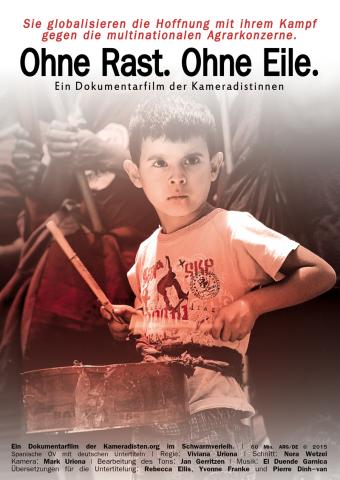Film: Ohne Rast. Ohne Eile und Sachamanta // Movies: No Rest. No Haste. and Sachamata

(english below)
Ohne Rast. Ohne Eile.
Dokumentarfilm, ARG/D, 60 min., OmU, 16:9
Buenos Aires, Dezember 2012. Die andere Seite der Weltkugel. Ein sommerheißes Weihnachten ist wenige Tage entfernt. Die Stadt erledigt ihre letzten Einkäufe. Flirrende Hitze steht über dem quirligen Verkehr. Das Bundesparlament trifft seine letzten Entscheidungen. Die Polizei döst in Gleichgültigkeit. Ganz plötzlich strömen hunderte Indigene durch die Straßenschluchten in das Stadtzentrum. Die Uralten, die Frauen, die Männer und die Kinder sperren erst die Hauptverkehrsstraße vor dem Parlament, dann alle Seitenstraßen. Aktivistinnen und Aktivisten urbaner Gruppe schließen sich den Indigenen an. Gemeinsam verwandeln sie die Straßen in fahnenbunte Tanzplätze und entsenden ihre Unterhändler in den Congreso.
Die Heimat der Indigenen liegt fast eintausend Kilometer entfernt in einem zweiten, einem anderen, einem vergessenen Argentinien ohne Wolkenkratzer, ohne Fernsehempfang und ohne Krankenhäuser. Ihre Heimat ist das staubige Buschland des Nordens. Die Heimat ist bedroht. Denn genetisch verändertes Saatgut, Herbizide und chemischer Dünger haben den Sojaanbau nun auch in den kargen nördlichen Regionen rentabel gemacht. Das Land wird zum Spekulationsobjekt von Monsanto & Co. Wie schon am Anfang der kolonialen Geschichte des Landes sollen die Indigenen wieder einmal weichen. Doch diesmal kommt alles anders als erwartet. Sie weichen nicht. Sie leisten Widerstand. Es ist ein Kampf, der zwanzig Jahre währt. Die Indigenen schlagen nicht nur die Landräuber in die Flucht, sondern sie haben damit begonnen, in ihren Territorien die Staatsgewalt durch eigene, egalitäre Strukturen zu ersetzten. Sie errichten neue Brunnen, Solaranlagen, eigene Schulen und nun ein erste Universität, die das Lehren und Lernen neu erfindet. Im Kampf gegen die multinationalen Agrarkonzerne globalisieren die Campesin@s die Hoffnung.
„Ohne Rast. Ohne Eile.“ (Dokumentarfilm, ARG/D, 60 min., OmU, 16:9) ist ein partizipatives Projekt der Kameradistinnen. Der Interviewführung zugrunde lagen zahlreiche Botschaften von Menschen aus der Bundesrepublik an die Indigenen. Sie entstanden als Reaktionen auf unseren thematisch verwandten und ersten gemeinsamen Kinofilm „Sachamanta“. | „Ohne Rast. Ohne Eile.“ gäbe es nicht ohne die finanzielle, logistische und ideelle Unterstützung im Rahmen des Projektes „Espejo“ von über einhundert Menschen, Stiftungen und kleinen Unternehmen, die im Abspann des Filmes gewürdigt werden. Aus dem Projekt „Espejo“ entstand zudem auch der Kurzfilm, Tincunacuy, der die Rückkehr des Filmes Sachamanta an seinen Handlungsort zeigt und auf dieser Seite angesehen werden kann. Die Kameradistinnen sind eine freie Assoziation für Dokumentarfilm und Dokumentarfotografie mit einem kritischen Bewusstsein für Politik und Gesellschaft.
Sachamata
Dokumentarfilm, ARG/D, 50 min., OmU, 4:3
Der Norden Argentiniens im Jahre 2000: Auf einem Kongress beschließen die im Movimiento Campesino Santiago del Estero (MoCaSe-Via Campesina) organisierten bäuerlichen und indigenen Gemeinschaften etwas bis dahin Unerhörtes. Sie werden eigene Radiostationen aufbauen und betreiben. Sie wollen nicht länger hinnehmen, dass die Massenmedien ihre Lebenssituation entweder ignorieren oder verfälschen.
Heute existieren bereits fünf Sender. Die Campesinos nutzen sie, um über die Weite des Landes hinweg unzensiert Botschaften auszutauschen. Die Radios schaffen ein Gemeinschaftsgefühl. Sie stärken den Kampf der Kleinbäuerinnen und Kleinbauern gegen Landraub und Unterdrückung. Und natürlich bringen diese Sender endlich auch die Musik der Campesinos.
Es geht darum, gehört zu werden. Viviana Uriona gibt in ihrem Dokumentarfilm den Entrechteten und Widerständigen eine Stimme. Sie liefert keine Interpretation der Erzählung, sondern gibt ihren Protagonisten die Möglichkeit – gleichlaufend zu Forderungen nach eigenen Radiostationen – nackt und ungeschützt zu sagen, was Sache ist. Im Film zerschneiden die Bauern in subversiven Akten die Stacheldrahtzäune der Konzerne, gleichzeitig fallen in den Köpfen der Zuschauer die bisher sicher geglaubten Grenzen des Machbaren. Unmögliches erscheint greifbar nah.
Der Film macht Mut, gegen die eigenen kleinen und großen gesellschaftlichen Ungerechtigkeiten zu kämpfen und gemeinsam die Stimme zu erheben – erscheint es zunächst auch noch so aussichtslos.
Oder, wie die alte Eloisa im Film mit einem Kopfschütteln sagt: “Mein Mann wollte schon aufgeben. Der Arme!”
Die Filmemacherin Viviana Uriona ist Mitte der 1990er Jahre aktiv im Filmclub 813 in Köln gewesen, zuletzt erarbeitete sie zahlreiche Radiofeatures. Ihr Interesse für das Radio und seine demokratische Kraft trieb sie zu Filmarbeiten in den Norden Argentiniens. Nora Wetzel (Schnitt und Dramaturgie) ist seit 2006 selbstständig in Schnitt und Regie und arbeitete zuletzt an einem Dokumentarfilm über kubanische Straßenmusiker. Die Kameradistinnen sind eine freie Assoziation für Dokumentarfilm und Dokumentarfotografie mit einem kritischen Bewusstsein für Politik und Gesellschaft.
No Rest. No Haste.
Documentary, ARG /Germany, 60 min, English subtitles, 16:9.
Buenos Aires, December 2012. A hot Christmas is only a few days away. Last purchases are made. Shimmering heat is all over the city and above the always bustling traffic. The Federal Parliament makes its final decisions before the holidays. The Police outside is dozing in indifference. All of a sudden hundreds of indigenous people flow through the urban canyons towards the city center. The old, the young, the women, and the men first squad the main road in front of Parliament, then they take over all side streets, block all the traffic. Urban groups join them. Together they transform the streets into colorful dancing courses and they send their negotiators in the Congreso.
The home of the Indigenous is almost a thousand miles away. It is another Argentina, a forgotten one. It is an Argentina without skyscrapers, TV and hospitals. It is the Argentina of the dusty scrubland of the north. But home is always home, is it? The home of the indigenous people is under threat. Because GM seeds, Herbicides and chemical fertilizers have now made the soybean cultivation profitable even in the barren northern regions and they have turned the country into an object of speculation by Monsanto & Co.
Just as in the beginning of the colonial history of the country, once again the indigenous are supposed to recede. But this time everything is different. They do not recede. They resist. It is a struggle of now twenty years in within not only the land grabbers are defeated but moreover the indigenous people have begun to replace state power in their territories by egalitarian structures new to the globe. They build wells, solar systems, their own schools and now even a university that reinvents the teaching and the learning. In the fight against the multinational agribusinesses the Campesin@s globalize hope for all of us.
“No Rest. No Haste.” (Documentary, ARG /Germany, 60 min, English subtitles, 16:9.) is a participatory project of Kameradists. The interviews were based on numerous messages from people from the Federal Republic to the indigenous people. They arose as reactions to our thematically related and first film “Sachamanta“. | “No Rest. No Haste.” would not exist without the financial, logistical and moral support for the project “Espejo“ of more than one hundred people, foundations and small businesses, which are recognized in the credits of the film. From the project “Espejo” also sprang the short film “Tincunacuy”, showing the return of the film “Sachamanta” to the people, that it portraits. “Tincunacuy” can be watched online under this link. The Kameradists are a free association for documentary filmmaking and documentary photography with a critical awareness of politics and society.
Sachamata
Documentary, ARG/Germany, 50 min., OmU, 4:3
The north of Argentina in the year 2000: At a congress the peasant and indigenous communities organized within the Movimiento Campesino in Santiago del Estero (MoCaSe-Via Campesina) decided something previously unheard of: They will build and operate their own radio stations. No longer will they endure the mass media’s ignorant and erroneous coverage of their life situation. Today five stations are already operating. The campesinos use them to exchange uncensored messages across the entire country. The radio stations provide a sense of community. They strengthen the struggle of the peasants against land theft and oppression. And of course the five stations bring the music that the campesinos love.
It’s all about finally being listened to. In her documentary Viviana Uriona gives a voice to those who have been robbed of their rights and are standing up against disenfranchisement. It is up to them to tell the story of the film trough their own narratives. And they do say what they have to say with just as much self-confidence which helped them start the radio stations. Now these stations aid their struggle for self-determination and against injustice and land grabbing. In the documentary, the peasants engage in the subversive act of tearing down the barbed wire fences belonging to the big corporations, dissipating the previously conceived notions of what is possible in the minds of the public. Now, all across the country, justice, previously thought of as an unattainable utopia, seems within reach.
The film gives courage to stand up against all social injustices, big and small, that used to seem so insurmountable – even in the western world.
Just as the old Eloisa says in the film: “My husband almost wanted to give up. Poor boy.”
In the mid-90s the filmmaker Viviana Uriona was involved with the Cologne Filmclub 813. Lately she focused on the production of radio features. Her interest in radio and its democratic power drove her into the north of Argentina for filming. Nora Wetzel (Editor) is a free director and editor since 2006. She recently finished a documentary on Cuban street musicians. The Kameradists are a free association of documentary filmmakers and photographers with a critical view of politics and society.
